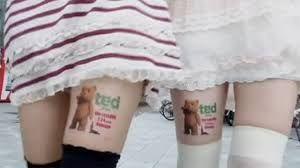3,000 Tokyo Women Are Selling Their Skin To Become Walking Ads: Are They Exacerbating Female Body Issues?

It seems that everywhere we look today, a different advertisement is staring us in the face, trying to make us buy some new product. In fact, men in Japan can't even look at a woman's body without being coerced by some kind of marketing scheme.
Hidenori Atsumi, CEO of advertising agency WIT, has launched an unorthodox advertising campaign that involves women selling their upper thighs for billboard space, the Guardian reported. Atsumi calls his method for product placement "perfect" because it's an area of the body that "guys are eager to look at and girls are OK to expose."
The advertising scheme has already attracted over 3,000 participants over the age of 18 who are willing to dress in miniskirts and long socks to catch even more attention. Although this seems like an effective way to draw notoriety to a company's product in a city like Tokyo where ads are so abundant, what concerns can arise when other women start to question their own body image?
A recent study conducted by the University of Chicago/National Opinion Research Center probed body image concerns among Chinese adults. Researchers issued questionnaires to 930 Chinese women and 893 Chinese men between the ages of 20 and 45 to determine prevalence, risk factors, and after effects of body image concerns.
Results of the survey showed that a women's body image was heavily dependent on the fluctuation of their weight while men were more concerned with their socioeconomic status. The research team also pointed out certain consequences related to a negative self-image, including diminished self-esteem, depression, and eating disorders.
If you or someone you know is suffering from a negative self-body image, consider cognitive behavioral therapy as a form of treatment. This method calls for patients to recognize and confront an irrational thought that is affecting their frame of mind. Either way, treatment should be sought out if depressing thoughts persist.
Published by Medicaldaily.com



























